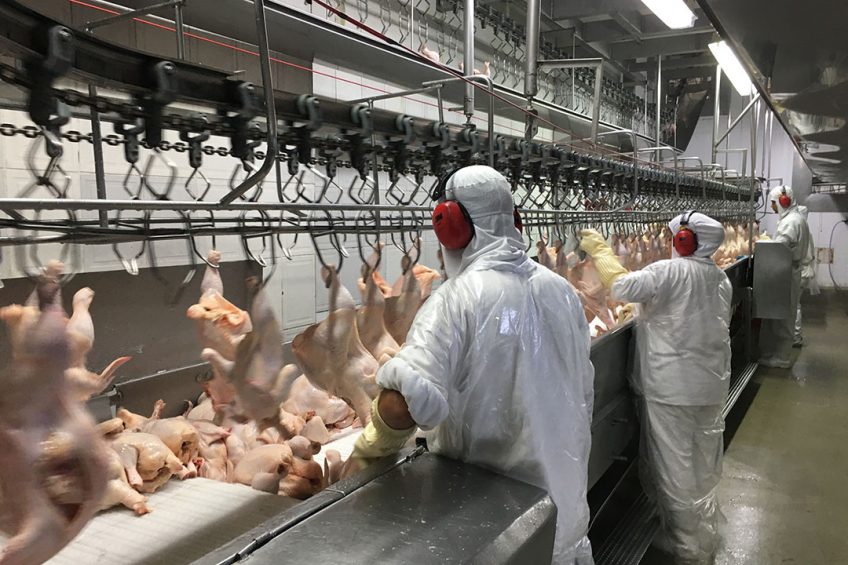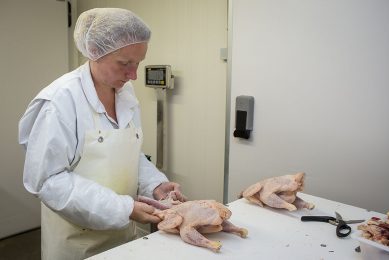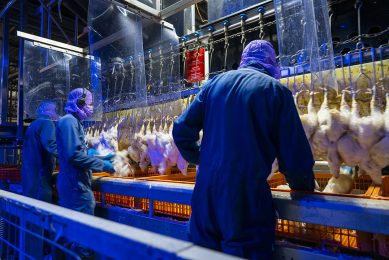Covid-19 disrupts poultry production chain

As it travels around the globe the coronavirus is disrupting large parts of society and the economy. Covid-19 has not left the poultry production chain untouched either, infecting workers, disrupting the supply chain and impacting demand. Poultry World reports.
With the spread of the new and deadly virus, ‘normal’ has flown out of the window when it comes to the food supply chain. During the first few weeks of the outbreak consumers were seen to be hoarding toilet paper for no obvious reason and eggs and meat with good reason. A surge in demand to ensure there was food on the table left supermarket shelves empty and suppliers struggling to keep up, while trying to cope with the virus themselves.
Egg shortages
In Canada, the US and Europe, the Covid-19 pandemic led to ‘panic buying’ of groceries to stockpile food against possible future food shortages, also the closure of many restaurants. These factors have greatly impacted both the egg and chicken sectors. There are reports, for example, that in many areas of the US workers at major chicken producers, such as Tyson Food, Sanderson Farms and Perdue Farms, have been forced to work overtime to meet higher production levels.
At some stores in Canada eggs have been sold out at various times. Some of this is also due to panic buying but the Federation des producteurs d’œufs du Quebec (FPOQ) explained that temporary egg shortages have occurred in certain grocery stores in that province due to restaurant closures and changes in the egg distribution channels as a result. In European countries too, consumers found supermarket shelves bare, even in a period when extra eggs were being delivered due to the Easter peak demand. However, once packers had shifted deliveries from their closed food-service customers to supermarkets the situation soon normalised again in the US and Canada. United Egg Producers (UEP, the main egg farmers’ association in the US) issued a statement saying it was “aware some Americans have faced empty store shelves and egg cases early in this outbreak, and we understand you have concerns. UEP’s farmer members are committed to producing a consistent supply of eggs.”

Virus hits poultry processing plants
It was not easy to make sure that the supply of poultrymeat and eggs was sufficient to meet demand as the virus hit the poultry chain as well. Dozens of meat-processing plants have been forced to close temporarily as the industry struggles to contain the spread of the coronavirus among employees who often have to stand side-by-side while cutting and packing poultry. Meat giant Tyson foods warned at the end of April that the food supply chain was in danger of collapsing. Board chairman John Tyson fears that millions of animals will have to be destroyed due to the closure of processing facilities. And Tyson is not alone in that: since April the world’s largest meat companies – including Smithfield Foods, Cargill and JBS USA – have had to shut down operations in processing plants in North America as workers fell ill.
 Moy Park spends £4 million on Covid-19 protection for staff
Moy Park spends £4 million on Covid-19 protection for staff
Poultry processor Moy Park has spent £4million on safety and supportive measures to help protect its staff against coronavirus. Included in the investment are advanced safety measures, as well as enhanced reward packages for team members to thank them for their efforts as key workers.
Early signs of the impact of the virus could be seen in March when at least one worker at a chicken processing plant in the US State of Georgia owned by Perdue was confirmed to have Covid-19, making the safety of other workers at the plant a volatile issue. On Monday 23 March dozens of other workers at the plant walked off the job to protest outside about a perceived lack of sanitary working conditions and other related concerns. A workforce representative said she and her co-workers would like the building disinfected and everyone exposed to the infected person sent home. More or less the same happened at a poultry processing facility of Moy Park in Europe. Workers at one of Moy Park’s poultry processing factories in Northern Ireland staged a walkout on Wednesday 25 March over coronavirus fears. The staff were concerned about the working arrangements inside the factory and the lack of measures to combat the spread of the coronavirus. Both companies said they had enacted strict protocols following guidance from their national centres for disease control.
No food service, no ducksOne of the first consequences of the lockdown, stay at home or shelter in place orders in many countries was that the food service industry effectively stopped working. Yes, there were some smart entrepreneurs who switched to home deliveries and others that set up take away counters, but the traditional restaurant business effectively ceased. This had an immediate impact on the demand for and turnover from poultrymeat. A sector that was particularly severely affected was the duck meat business of Duck-To farms in the Netherlands, part of part of the BR-Group which includes Bangkok Ranch.  Duck-To owner Gert Jan Tomassen was forced to make hard decisions and temporarily halt production. Photo: Koos Groenewold The Duck-To farms and processing facility is the only duck producer in Northwestern Europe and provides duck meat to the food service industry and Chinatown businesses in Europe. This market has totally crashed, leading to difficult decisions at Duck-To. In March the company decided to stop hatching ducklings and placing them on farms for an initial period of eight weeks, effectively halting production and leaving farms empty. All birds that were already in the grow-out phase would be processed and then stocked as frozen product. The owner expects that the decision will ripple across the whole duck sector as parent stock will also be slaughtered earlier than planned to cut costs. |
Focus on continuity of poultry production
Even with measures to control the virus within a company, ensuring the continuity of production is fraught with difficulties. With governments restricting travel and border crossings, it was by no means easy to arrange work permits for foreign workers.
US: Lack of foreign workers endangered poultry supply
Tens of thousands of temporary foreign workers are brought into the United States and Canada every year to work in both countries’ meat processing plants and on farms. Due to Covid-19 there are serious concerns that the same number of workers will not be allowed to enter this year, putting food production, business survival and food security at risk. On Tuesday 24 March the US State Department announced it would suspend the processing of temporary work visas in Mexico because of Covid-19. However that suspension was lifted by Friday 27 March. This was at least partly as a result of a letter sent to the State Department, the Department of Labor and the Department of Homeland Security by elected officials from North Carolina and signed by over 100 members of Congress. It called for visa processing in Mexico to be resumed because its suspension was endangering the nation’s food supply chains.
Canada: Protocols for foreign workers within the poultry sector
Employment and Social Development is the ministry responsible for Canada’s Temporary Foreign Worker Program (TFWP) and handles all foreign worker permits. Jean-Michel Laurin, president and CEO of the Canadian Poultry & Egg Processors Council, commented on the Canadian situation. He notes that members employ temporary workers from many countries, such as Jamaica, Mexico and Guatemala, including several in Eastern Europe. To try to ensure that there are adequate numbers of temporary workers this year in the face of Covid-19, Laurin reports that discussions were held with the Canadian Federation of Agriculture, the Quebec farmer’s union and Agriculture & Agri-food Canada (AAFC). AAFC put forward strict protocols which it expects all farming and food processing employers to adhere to with regard to the use of foreign workers. These conditions will likely include medical screening before and after the flight to Canada, private transport to accommodation and a 14-day quarantine period. Laurin says there may also be the opportunity for foreign workers now in Canada to extend their stay, if they are willing and able to do so. The poultry industry relies heavily on the availability of foreign workers to put food on the table, in Canada and in the rest of the world.
No flights, no breeding stockThe sharp reduction in global air transport caused by the coronavirus pandemic could leave some companies without breeding stock and hatching eggs, the International Poultry Council warned at the beginning of April. In the long-run the supply disruptions could jeopardise food security globally, says the poultry processors’ organisation. The first to be affected by the lack of air freight will be the exporting countries. Hatching egg and day-old chick exporters in the Netherlands started euthanising chicks and destroying eggs in March as destinations became out of reach. Some birds could be relocated within Europe but transport to one of its main export markets – Africa – stopped altogether. Spokesperson Anton Butijn fears for the future of the African producers. “They rely heavily on imports of day-old chicks which are crucial for their food supply,” he says. “Every month we supply 1.7 million day-old layer chicks to Ghana, Congo, Nigeria and Ivory Coast. The egg production of those birds will now never come to market and on top of that we will be forced to destroy parent stock as well.”  Disrupted air transport has had a major impact on the distribution of breeding stock as well. Photo: Mark Pasveer But the African countries are not the only ones dependent on imports. China and especially poultry-production powerhouse Russia, rely heavily on foreign supplies. “The self-sufficiency rate for hatching eggs for day-old chicks is currently at about 90% in Russia,” Albert Davleyev, president of the Russian consulting agency Agrifood Strategy told local news outlet Interfax. “On the other hand, the hatching eggs of the parent stock for both layers and broilers is completely dependent on imports,” he added. “In the turkey industry almost 97% of eggs, 100% of chicks and 100% of parent flock in Russia are currently imported from Europe and Canada.” Davleyev further warned that a prolonged supply disruption could significantly reduce the ability of the Russian poultry industry to ensure an adquate supply of poultrymeat and eggs for Russian consumers. |
Co-author: Fabian Brockotter












